#dried dates
Text
GOLDEN CHOCOLATE CHAI MILKSHAKE (Vegan) by earthyandy.com
#smoothie#milkshake#recipe#chocolate#cold smoothie#summer#chai latte#vegan#dried dates#cacao#ginger#almond milk#bananas#cashew butter#peanut butter#healthy#drinks#food
2 notes
·
View notes
Text
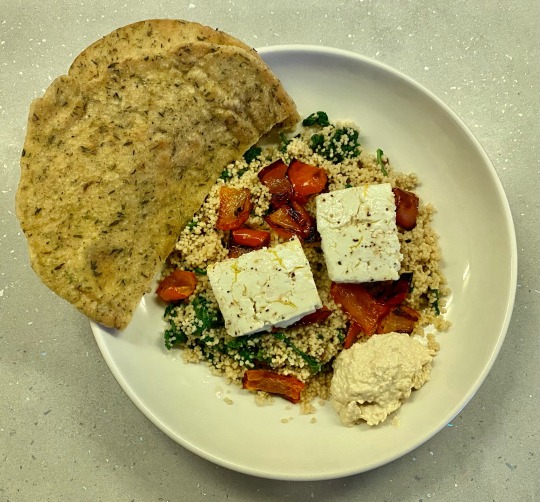
Couscous with roasted peppers, spinach, Greek cheese, dried dates,honey dressing, flatbread, hummus/houmous…..
7 notes
·
View notes
Text
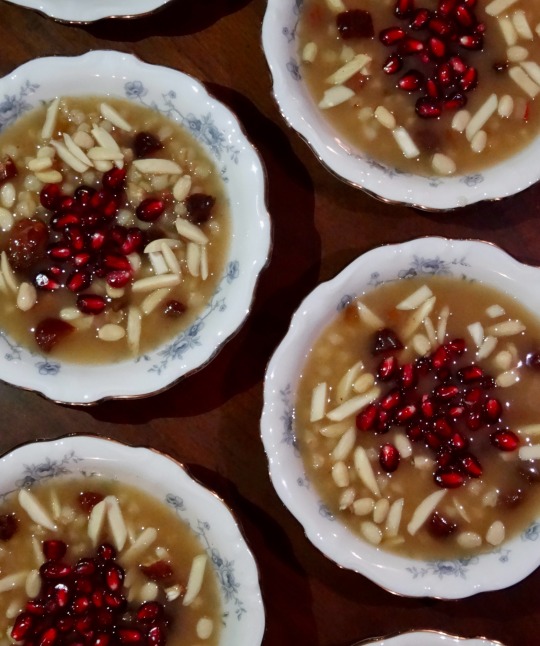
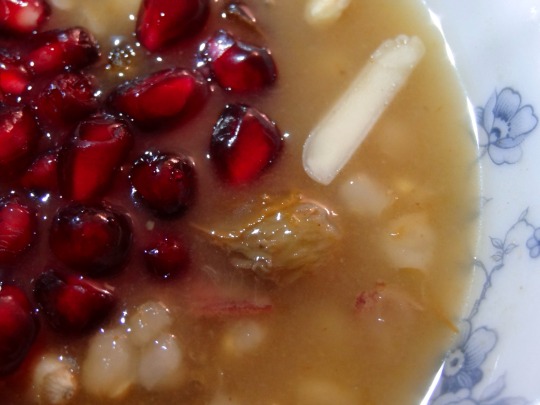
[ID: First image shows four small porcelain bowls of a pudding topped with slivered almonds and pomegranates seeds, seen from above. Second image is an extreme close-up showing the blue floral pattern on the china, slivered almonds, golden raisins, and pomegranate seeds on top of part of the pudding. End ID]
անուշապուր / Anush apur (Armenian wheat dessert)
Anush apur is a sweet boiled wheat pudding, enriched with nuts and dried fruits, that is eaten by Armenians to celebrate special occasions. One legend associates the dish with Noah's Ark: standing on Mt. Ararat (Արարատ լեռը) and seeing the rainbow of God's covenant with humanity, Noah wished to celebrate, and called for a stew to be prepared; because the Ark's stores were diminishing, the stew had to be made with small amounts of many different ingredients.
The consumption of boiled grains is of ancient origin throughout the Levant and elsewhere in West Asia, and so variations of this dish are widespread. The Armenian term is from "անուշ" ("anush") "sweet" + "ապուր" ("apur") "soup," but closely related dishes (or, arguably, versions of the same dish) have many different, overlapping names.
In Arabic, an enriched wheat pudding may be known as "سْنَينِيّة" ("snaynīyya"), presumably from "سِنّ" "sinn" "tooth" and related to the tradition of serving it on the occasion of an infant's teething; "قَمْح مَسْلُوق" ("qamḥ masluq"), "boiled wheat"; or "سَلِيقَة" ("salīqa") or "سَلِيقَة القَمْح" ("salīqa al-qamḥ"), "stew" or "wheat stew," from "سَلَقَ" "salaqa" "to boil." Though these dishes are often related to celebrations and happy occasions, in some places they retain an ancient association with death and funerary rites: qamh masluq is often served at funerals in the Christian town of بَيْت جَالَا ("bayt jālā," Beit Jala, near Bethlehem).
A Lebanese iteration, often made with milk rather than water, is known as "قَمْحِيَّة" ("qamḥīyya," from "qamḥ" "wheat" + "ـِيَّة" "iyya," noun suffix).
A similar dish is known as "بُرْبَارَة" ("burbāra") by Palestinian and Jordanian Christians when eaten to celebrate the feast of Saint Barbara, which falls on the 4th of December (compare Greek "βαρβάρα" "varvára"). It may be garnished with sugar-coated chickpeas and small, brightly colored fennel candies in addition to the expected dried fruits and nuts.
In Turkish it is "aşure," from the Arabic "عَاشُوْرَاء" ("'āshūrā"), itself from "عَاشِر" ("'āshir") "tenth"—because it is often served on the tenth day of the month of ٱلْمُحَرَّم ("muḥarram"), to commemorate Gabriel's teaching Adam and Eve how to farm wheat; Noah's disembarkment from the Ark; Moses' parting of the Red Sea; and the killing of the prophet الْحُسَيْن بْنِ عَلِي (Husayn ibn 'Ali), all of which took place on this day in the Islamic calendar. Here it also includes various types of beans and chickpeas. There is also "diş buğdayı," "tooth wheat" (compare "snayniyya").
These dishes, as well as slight variations in add-ins, have varying consistencies. At one extreme, koliva (Greek: "κόλλυβα"; Serbian: "Кољиво"; Bulgarian: "Кутя"; Romanian: "colivă"; Georgian: "კოლიო") is made from wheat that has been boiled and then strained to remove the boiling water; at the other, Armenian anush apur is usually made thin, and cools to a jelly-like consistency.
Anush apur is eaten to celebrate occasions including New Year's Eve, Easter, and Christmas. In Palestine, Christmas is celebrated by members of the Armenian Apostolic church from the evening of December 24th to the day of December 25th by the old Julian calendar (January 6th–7th, according to the new Gregorian calendar); Armenian Catholics celebrate on December 24th and 25th by the Gregorian calendar. Families will make large batches of anush apur and exchange bowls with their neighbors and friends.
The history of Armenians in Palestine is deeply interwoven with the history of Palestinian Christianity. Armenian Christian pilgrimages to holy sites in Palestine date back to the 4th century A.D., and permanent Armenian monastic communities have existed in Jerusalem since the 6th century. This enduring presence, bolstered by subsequent waves of immigration which have increased and changed the character of the Armenian population in Palestine in the intervening centuries, has produced a rich history of mutual influence between Armenian and Palestinian food cultures.
In the centuries following the establishment of the monasteries, communities of Armenian laypeople arose and grew, centered around Jerusalem's Վանք Հայոց Սրբոց Յակոբեանց ("vank hayots surbots yakobeants"; Monastery of St. James) (Arabic: دَيْر مَار يَعْقُوب "dayr mār ya'qūb"). Some of these laypeople were descended from the earlier pilgrims. By the end of the 11th century, what is now called the Armenian Quarter—an area covering about a sixth of the Old City of Jerusalem, to the southwest—had largely attained its present boundaries.
Throughout the 16th and 17th centuries, the Patriarchate in Jerusalem came to have direct administrative authority over Armenian Christians across Palestine, Lebanon, Egypt, and Cyprus, and was an important figure in Christian leadership and management of holy sites in Jerusalem (alongside the Greek Orthodox and Roman Catholic churches). By the middle of the 19th century, a small population of Armenian Catholics had joined the larger Armenian Apostolic community as permanent residents in Jerusalem, living throughout the Muslim Quarter (but mostly in a concentrated enclave in the southwest); in the beginning of the 20th century, there were between 2,000 and 3,000 Armenians of both churches in Palestine, a plurality of whom (1,200) lived in Jerusalem.
The Turkish genocide of Armenians beginning in 1915 caused significant increases in the populations of Armenian enclaves in Palestine. The Armenian population in Jerusalem grew from 1,500 to 5,000 between the years of 1918 and 1922; over the next 3 years, the total number of Armenians in Palestine (according to Patriarchate data) would grow to 15,000. More than 800 children were taken into Armenian orphanages in Jerusalem; students from the destroyed Չարխափան Սուրբ Աստվածածին վանք (Charkhapan Surb Astvatsatsin Monastery) and theological seminary in Armash, Armenia were brought to the Jerusalem Seminary. The population of Armenian Catholics in the Muslim Quarter also increased during the first half of the 20th century as immigrants from Cilicia and elsewhere arrived.
The immediate importance of feeding and housing the refugees despite a new lack of donations from Armenian pilgrims, who had stopped coming during WW1—as well as the fact that the established Armenian-Palestinians were now outnumbered by recent immigrants who largely did not share their reformist views—disrupted efforts on the part of lay communities and some priests to give Armenian laypeople a say in church governance.
The British Mandate, under which Britain assumed political and military control of Palestine from 1923–1948, would further decrease the Armenian lay community's voice in Jerusalem (removing, for example, their say in elections of new church Patriarchs). The British knew that the indigenous population would be easier to control if they were politically and socially divided into their separate religious groups and subjected to the authority of their various religious hierarchies, rather than having direct political representation in government; they also took advantage of the fact that the ecclesiastical orders of several Palestinian Christian sects (including the Armenian Patriarchate of Jerusalem) comprised people from outside of Palestine, who identified with religious hierarchy and the British authorities more than they identified with the Palestinian lay communities.
British policy, as well as alienating Armenians from politics affecting their communities, isolated them from Arab Palestinians. Though the previously extant Armenian community (called "քաղաքացի" "kaghakatsi," "city-dwellers") were thoroughly integrated with the Arab Palestinians in the 1920s, speaking Arabic and Arabic-accented Armenian and eating Palestinian foods, the newer arrivals (called "زُوَّار" / "զուվվար" "zuwwar," "visitors") were unfamiliar with Palestinian cuisine and customs, and spoke only Armenian and/or Turkish. Thus British policies, which differentiated people based on status as "Arab" (Muslim and Christian) versus "Jewish," left new Armenian immigrants, who did not identify as Arab, disconnected from the issues that concerned most Palestinians. They were predominantly interested in preserving Armenian culture, and more concerned with the politics of the Armenian diaspora than with local ones.
Despite these challenges, the Armenian Patriarchate of Jerusalem came to be a vital center of religious and secular culture for the Armenian diaspora during the British Mandate years. In 1929, Patriarch Yeghishe Turian reëstablished the Սուրբ Յակոբեանց Տպարան ("surbots yakobeants taparan"; St. James printing house); the Patriarchate housed important archives relating to the history of the Armenian people; pilgrimages of Armenians from Syria, Lebanon, and Egypt increased and the economy improved, attracting Armenian immigrants in higher numbers; Armenians held secular roles in governance, policing, and business, and founded social, religious, and educational organizations and institutions; Armenians in the Old and New Cities of Jerusalem were able to send financial aid to Armenian victims of a 1933 earthquake in Beirut, and to Armenians expelled in 1939 when Turkey annexed Alexandretta.
The situation would decline rapidly after the 1947 UN partition resolution gave Zionists tacit permission to expel Palestinians from broad swathes of Palestine. Jerusalem, intended by the plan to be a "corpus separatum" under international administration, was in fact subjected to a months-long war that ended with its being divided into western (Israeli) and eastern (Palestinian) sections. The Armenian population of Palestine began to decline; already, 1947 saw 1,500 Armenians resettled in Soviet Armenia. The Armenian populations in Yafa and Haifa would fall yet more significantly.
Still, the Armenian Patriarchate of Jerusalem maintained its role as the center of Armenian life in Palestine; the compound provided food and shelter to thousands of Armenians during the Battle for Jerusalem and the Nakba (which began in 1948). Some Armenians formed a militia to defend the Armenian Quarter against Haganah shelling during the battle.
In the following years, historical British contributions to the shoring up of insular power in the Patriarchate would cause new problems. The Armenian secular community, no longer empowered to oversee the internal workings of the Patriarchate, could do nothing to prevent embezzling, corruption, and even the sale of church-owned land and buildings to settlers.
In 1967, Israeli military forces annexed East Jerusalem, causing another, albeit smaller, surge in Armenian emigration from the city. Daphne Tsimhoni estimates based on various censuses that the Armenian population of Jerusalem, which had reached 5,000-7,000 at its peak in 1945–6, had fallen back to 1,200 by 1978.
Today, as in the 20th century, Armenians in Jerusalem (who made up nearly 90% of the Armenian population of Palestine as of 1972) are known for the insularity of their community, and for their skill at various crafts. Armenian food culture has been kept alive and well-defined by successive waves of immigrants. As of 2017, the Armenian Patriarchate supplied about 120 people a day with Armenian dishes, including Ղափամա / غاباما "ghapama" (pumpkin stuffed with rice and dried fruits), թոփիկ / توبيك "topig" (chickpea-and-potato dough stuffed with an onion, nut, fruit, and herb filling, often eaten during Lent), and Իչ / ايتش "eetch" (bulgur salad with tomatoes and herbs).
Restaurants lining the streets of the Armenian and Christian quarters serve a mixture of Armenian and Palestinian food. Լահմաջո "lahmadjoun" (meat-topped flatbread), and հարիսա / هريس "harisa" (stew with wheat and lamb) are served alongside ֆալաֆել / فلافل ("falafel") and մուսախան / مسخن ("musakhkhan"). One such restaurant, Taboon Wine Bar, was the site of a settler attack on Armenian diners in January 2023.
Up until 2023, despite fluctuations in population, the Armenian community in Jerusalem had been relatively stable when compared to other Armenian communities and to other quarters of the Old City; the Armenian Quarter had not been subjected to the development projects to which other quarters had been subjected. However, a deal which the Armenian Patriarchate had secretly and unilaterally made with Israel real estate developer Danny Rotham in 2021 to lease land and buildings (including family homes) in the Quarter led Jordan and Palestine to suspend their recognition of the Patriarch in May of 2023.
On 26th October, the Patriarchate announced that it was cancelling the leasing deal. Later the same day, Israeli bulldozers tore up pavement and part of a wall in حديقة البقر ("ḥadīqa al-baqar"; Cows' Garden; Armenian: "Կովերի այգու"), the planned site of a new luxury hotel. On 5th November, Rothman and other representatives of Xana Gardens arrived with 15 settlers—some of them with guns and attack dogs—and told local Armenians to leave. About 200 Armenian Palestinians arrived and forced the settlers to stand down.
On 12th and 13th November, the developer again arrived with bulldozers and attempted to continue demolition. In response, Armenian Palestinians have executed constant sit-ins, faced off against bulldozers, and set up barricades to prevent further destruction. The Israeli occupation police backed settlers on another incursion on 15th November, ordering Armenian residents to vacate the land and arresting three.
On December 28th, a group of Armenian bishops, priests, deacons, and seminary students (including Bishop Koryoun Baghdasaryan, the director of the Patriarchate's real estate department) were attacked by a group of more than 30 people armed with sticks and tear gas. The Patriarchate attributed this attack to Israeli real estate interests trying to intimidate the Patriarchate into abandoning their attempt to reverse the lease through the court system. Meanwhile, anti-Armenian hate crimes (including spitting on priests) had noticeably increased for the year of 2023.
These events in Palestine come immediately after the ethnic cleansing of Լեռնային Ղարաբաղ ("Lernayin Gharabagh"; Nagorno-Karabakh); Israel supplied exploding drones, long-range missiles, and rocket launchers to help Azerbaijan force nearly 120,000 Armenians out of the historically Armenian territory in September of 2023 (Azerbaijan receives about 70% of its weapons from Israel, and supplies about 40% of Israel's oil).
Support Palestinian resistance by donating to Palestine Action’s bail fund; buying an e-sim for distribution in Gaza; or donating to help a family leave Gaza.
Ingredients
180g (1 cup) pearled wheat (قمح مقشور / խոշոր ձաւար), soaked overnight
3 cups water
180-360g (a scant cup - 1 3/4 cup) sugar, or to taste
Honey or agave nectar (optional)
1 cup total diced dried apricots, prunes, golden raisins, dried figs
1 cup total chopped walnuts, almonds, pistachios
1 tsp rosewater (optional)
Ceylon cinnamon (դարչին) or cassia cinnamon (կասիա)
Aniseed (անիսոն) (optional)
Large pinch of salt
Pomegranate seeds, to top (optional)
A Palestinian version of this dish may add pine nuts and ground fennel.
Pearled wheat is whole wheat berry that has gone through a "pearling" process to remove the bran. It can be found sold as "pearled wheat" or "haleem wheat" in a halal grocery store, or a store specializing in South Asian produce.
Amounts of sugar called for in Armenian recipes range from none (honey is stirred into the dish after cooking) to twice the amount of wheat by weight. If you want to add less sugar than is called for here, cook down to a thicker consistency than called for (as the sugar will not be able to thicken the pudding as much).
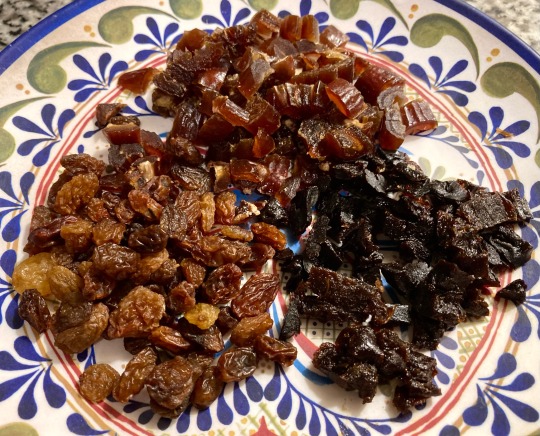
Instructions
1. Submerge wheat in water and scrub between your hands to clean and remove excess starch. Drain and cover by a couple inches with hot water. Cover and leave overnight.
2. Drain wheat and add to a large pot. Add water to cover and simmer for about 30 minutes until softened, stirring and adding more hot water as necessary.
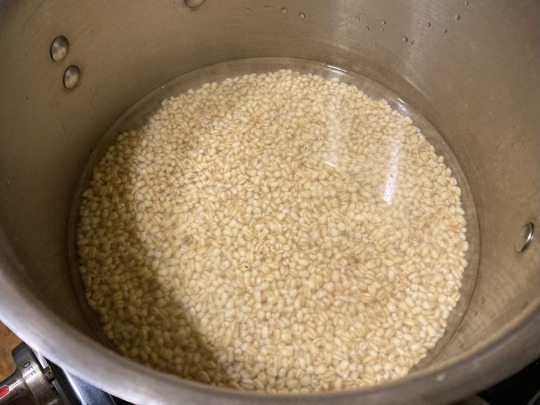
Wheat before cooking
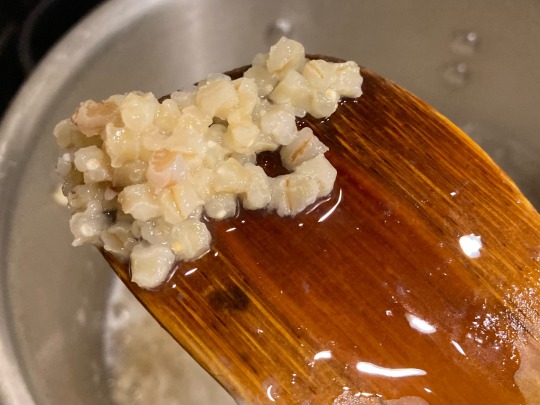
Wheat after cooking
3. Add dried fruit, sugar, salt, and spices and simmer for another 30 minutes, stirring occasionally, until wheat is very tender. Add water as necessary; the pudding should be relatively thin, but still able to coat the back of a spoon.
4. Remove from heat and stir in rosewater and honey. Ladle pudding into individual serving bowls and let cool in the refrigerator. Serve cold decorated with nuts and pomegranate seeds.
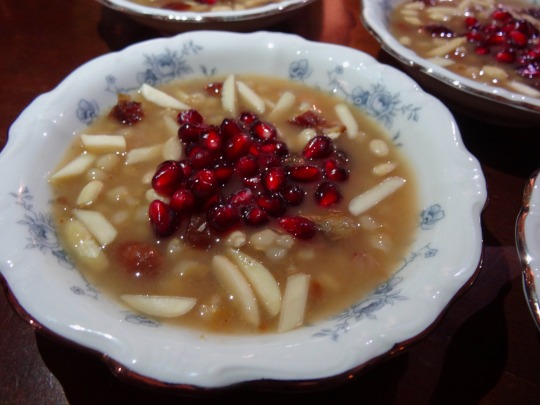
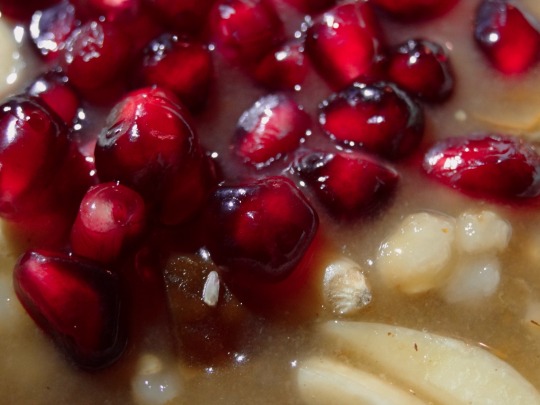
#the last link is a different / new fundraiser#Armenian#Palestinian#fusion#wheat berries#pearled wheats#pomegranate#prunes#dried apricot#dates#long post /
364 notes
·
View notes
Note
you said soft things so have this little thing very loosely based on how my first birthday after I moved away from home to live hours away from my family my brother got me a flower delivery thing each month for half a year. So for six months I had the same guy deliver flowers to me, it wasn’t anything but like… it could be, I can make it steddie (it’s 3:30 am and I wrote this in my notes so sorry for any mistakes)
So, Steve who moved kind of far away for college and is living in a shitty student apartment and hasn’t decorated it a lot and Robin thinks he needs something nice to look at every day and something to remind him he has people that loves him when he convinces himself that they’ve forgotten about him now that he’s away. So she gets him a flower delivery once a month with notes saying encouraging messages or bad jokes, sometimes a tiny update. It helps him, he’s not doing badly or anything and actually enjoys studying but he misses his friends.
Then we have Eddie who’s the flower delivery guy, it’s his side job, or it’s his main job and then he also gets payed to play some gigs sometimes. Either way, he delivers flowers. Mostly it’s to old people from their grandchildren, for birthdays, and from someone’s partner, often a partner that has fucked up (he also hand writes the messages that come in with the order and he’s had to write some very pleading apology ones in his time)
He has a monthly order to the same guy, the same gorgeous guy who last time opened the door looking so soft with glasses sliding down his nose and hair all messy and holding a cup of half drunk coffee and gave him such a warm smile he almost proposed to this stranger on the spot.
Every month he’s both so excited to deliver his flowers and also dreads it because he’s 99% sure this guys girlfriend sends them, that they’re long distance and she gets him flowers every month with little notes that he has to write, this month it was ‘I scraped up my whole leg climbing up the tree outside my window sneaking back into my room, I don’t know how you used to do that all the time.’ So like, obviously high school sweethearts if he used to sneak into her room.
So, it’s great because he gets to see this guy who’s stupidly pretty and always gets this wondrous look on his face like he’s still in awe about the flowers months in and that’s honestly the highlight of Eddie’s day. But, it’s awful because he also has to hand him flowers from someone else knowing he’s just some insignificant middle man.
Steve at this point gets more excited about the guy who delivers the flowers than the flowers, he loves them and all but this guy who comes every month and with a dimpled smile hands them over is taking over his brain. He doesn’t want to make him uncomfortable by asking him out though, like he’s doing his job and it feels inappropriate.
He complains to Robin who time after time tells him to just ask the guy out, if he says no it may be a little awkward but it’s a tiny interaction once a month it’s fine. Steve knows she’s right but still doesn’t, is afraid to break the spell of their monthly exchange. Robin grows tired of his pining though and the next time she places an order she makes the note ‘the guy who gets the flowers wants to ask the delivery guy out but keeps chickening out so I’m doing it for him: Delivery guy with bangs and ‘the prettiest brown eyes’ will you go out with Steve?’
Eddie reads that message of the order, has to write that message out with wide confused eyes and hope rising in his chest. When Steve opens his door he shoves the flowers at him and blurts out “I thought you were dating Robin”
Steve gives him a confused look, which yeah of course he does, so Eddie takes a breath and tells him to read the note. The confusion on Steve’s face slowly fades and is replaces with red cheeks and a sheepish smile.
He clears his throat and glances up at Eddie. “She’s my best friend,” he tells him, “may or may not get to keep that title depending on how this goes.”
Eddie is feeling too many things to say more than a breathy, “yes.” At Steve’s raised eyebrow though he clarifies.
“Yes I’ll go out with you.” Then a sudden horrifying thought hits him, “if you actually want that and your friend isn’t joking or got it wrong or-“
“Does 8 o’clock tonight work for you?”
Eddie nods and Steve’s smile gets wider with each frantic jerk of his chin.
“It’s a date then.”


and then on their first date, eddie gets flowers for the first time. doesn’t have to deliver them, doesn’t have to give them away, no, these ones are his to keep, and he allows himself to take a deep breath for the first time, getting to enjoy the way they smell, the way he always watched people do. never once taking his eyes off steve, who watches with a smile. 🥹
#and on their second date steve gives him a bouquet of dried flowers. ‘so they last longer’ he says with a blushing smile that eddie really#really wants to kiss (to make it last longer hehehe)#steddie fic#steddie#ughhh my HEART i love this i love you thank you so much it means the world 🥺🤍🌷#🤍#thank you thank you thank you 🥹🥰🤍🌷 flowers for you come on 🌷💐🌼
239 notes
·
View notes
Text
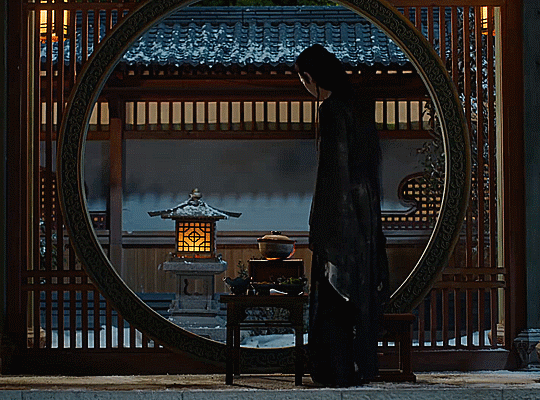
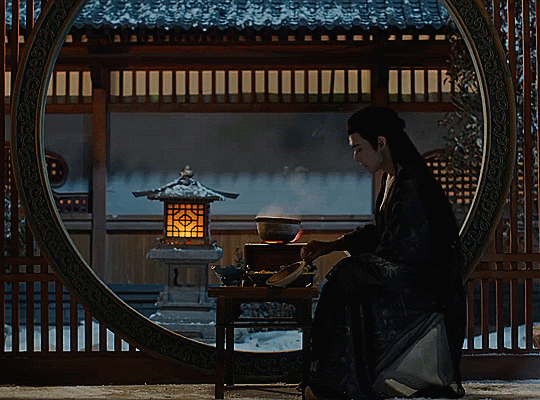
风月如雪 | The Snow Moon (2023)
#风月如雪#The Snow Moon#cdrama#(mini series)#Zuo Ye#character: bo qiu#what is this porridge#he put a date in it (ok)#but then followed up with a piece of dried kiwi (wut)#XD#meowmao gifs
129 notes
·
View notes
Text



flapping around in a haunted mansion?
#Bonnie: for the last time Kol I ain't doing a damn thing for u!#Kol: JUST LOVE ME ALREADY DARLING!#KENNETT LIVES#fuck Julie plec FR 💯#Kol was gonna get a witch lover ANYWAYS wdym he wasn't allowed to date Bonnie Julie tf you mean???#The Racist Diaries#Bonnie stan club#the vampire diaries#tvd#a softer mystic falls#tvdedit#bonnie bennett#bbennettedit#kol mikaelson#kmikaelsonedit#lovelyedits#tvd 4x23#kat graham#kennett#TVDU#tvd universe#tvd screencaps#a softer world remix#Bennett witches#anti julie plec#anti Caroline dries#kennettedit#bonniebennettedit#kolmikaelsonedit#tvdu edit
32 notes
·
View notes
Text
Farm Lexa has this hand bound book she made back when she was around sixteen. She made it to keep her pressed flowers. The very first page has pressed daisies and a date below them followed by a happy scribble, "Clarke asked me on a date."
The dandelion Clarke put in her hair after their first kiss. A black eyed susan they picked after their first time as they walked around the run down farm.
The petals of the deep red roses Clarke gifted Lexa the day they decided to get engaged.
One of each of the flowers Lexa walked down the aisle with. One of each of the flowers from Clarke's bouquet.
The english primrose that popped up in Lexa's garden not long after little Madi laughed for the first time.
The Lilly of the Valley a baby Saige found fascinating because fairies lived in them.
The poppies the twins ended up ripping from her garden because it matched their hair.
The small piece of baby's breath that showed up around the tree where they buried their baby soon after Lexa stepped out of her grief.
The sunflower petals that remind her of Clarke and their little sunshine boy Aden.
Every wild flower the kids offered her. At least one petal from the bouquets Clarke got her. Her favorite flowers from her garden. The ones she found on walks. All dated, all with a note on why they made her smile.
#ignoreme.jpg#farm clexa#it is 5 am i have not slept and i am thinking of Lexa in her greenhouse#its such a small thing in the middle of the farm#barely big enough for more than one person to be inside#but it has a table for Lexa to make bouquets to sell#and a little table where she dries and presses her flowers#its a quiet place in a house so full of babies#and yet it is all windows and she can always see what is happening#they find her little notebook when she passes#sitting in the cramp living room her children and her grandchildren and maybe even her great grandchildren#she is gone but lived a good life#and now here are all the people she loved looking at the little keepsakes she kept of their love for her#Clarke's wrinkling hand shaking with age and the pain of losing her wife touching the daisy#shed been so nervous holding the flowers in her hand after buying them at the market to go and ask lexa out#so excited to go on a date with her#it was a lifetime ago#they dated they married they had chilsren they built a life#oh and what a life#:') bye
35 notes
·
View notes
Text
Kind of want to ditch law school and buy this farm that's only $134k. I'm in the wrong part of NY.
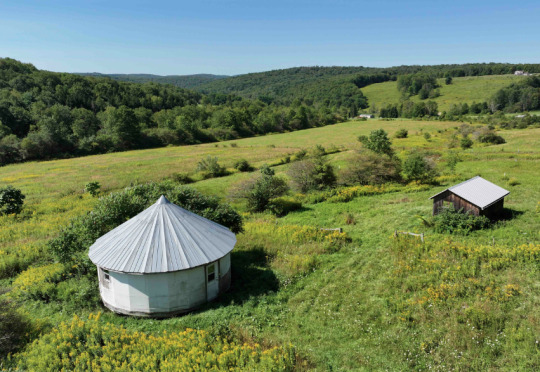
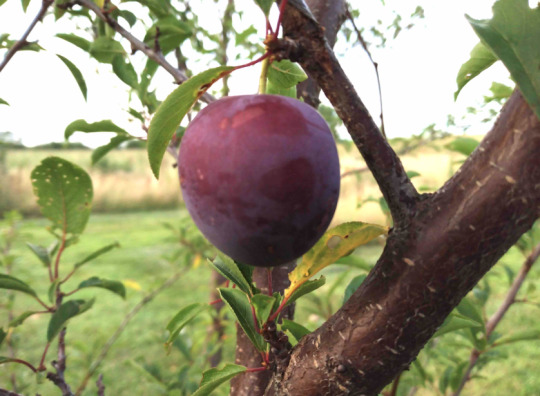
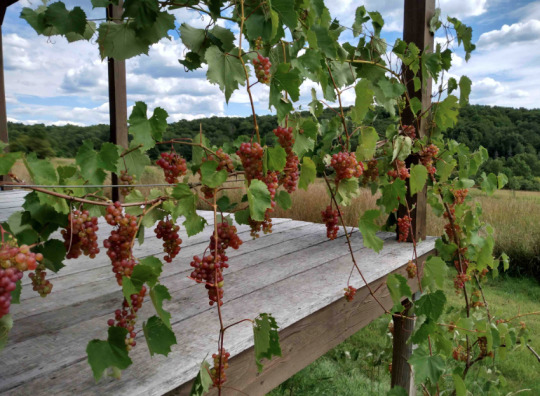

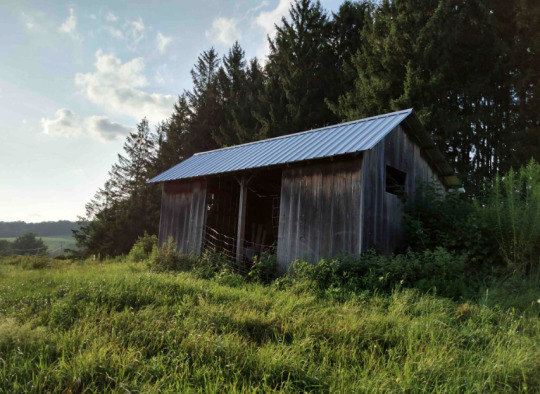
#the house is so cute for one person#from the outisde#inside is a little dated but not too bad#and its got a run in shed and pastures for amba#and a yurt thing where i can hang dried flowers#i hope a property like this goes up for sale at a similar price when i graduate
19 notes
·
View notes
Text
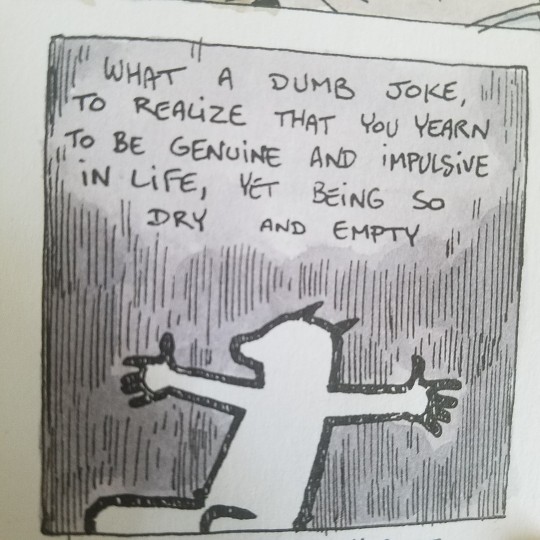
#feels like i shared this one b4 but i cant find it so idk so whatever#p.s. edit the date is cropped out oops this is from march actually#but still relevant yreeee#anyway whah ha h the core of my bullshit#like for like 2 years ive been more actively drawn to the feeling & the idea of like#yea idk being genuine and expressing yourself and just doing the things you want feels like what it's all about.#big start in all this was the stuff vyletpony was saying about the Antonymph song & the personal meaning / manifesto of it. you know#but i got nothin#like don't even feel like im rly holding anything back or having self-imposed barriers of shame or whatever. just nothing#like if you cracked open a dam and shit's all dried out so what was the point actually#feelin like an npc. nothin complex going on in there. surface level mechanisms#wah wah wah wahwah.#shevr
48 notes
·
View notes
Text

Dark Truths
It had been a day or two after Rael had returned to the Silver Bazaar to check in on A'viloh‘s condition. Early one morning, when A'vi had still been asleep, Kikipu had asked Rael to fetch a delivery for her from the nearby outpost. The way to the Scorpion Crossing wasn’t far and the merchant already had Kikipu‘s parcel prepared, so it was still before midday when they returned to the Bazaar.
"Thank you, Rael. Did you perhaps see A'vi outside?", the Lalafell asked as she took the delivery from Rael.
The Viera shook their head. "No, I haven’t. Why?"
"Oh, among the usual supplies there’s something exclusively for him in this parcel."
The Viera smiled. "Are you spoiling him, Kikipu?"
"Occasionally he deserves that.", Kikipu laughed. "Especially considering all the Gil he gave us."
"I guess that’s fair."
The Lalafell tilted her head and thought for a second. "Could you look for him? If he isn’t outside maybe he went down to the pier…"
"The pier?", Rael asked incredulously. "That seems unlikely…"
Kikipu sighed sadly. "Rael, you‘d be surprised about how stubbornly self-sabotaging that boy can be…"
"I’m going to look for him. He‘s probably only somewhere outside and I just missed him.", the Viera said, still not knowing how right Kikipu was with her statement.
Of course A'viloh wasn’t anywhere to be found in the settlement, so with a curse on their lips Rael followed the path leading down to the pier. As they stepped onto the wooden planks they indeed saw the Miqo'te sitting at the end of the jetty, his feet dangling a few ilms above the water.
"A'vi?", they called out to him hoping that it wouldn’t startle him.
"I‘m here.", he answered calmly without facing the Viera. He must have heard the steps even before Rael spoke.
Carefully Rael stepped closer and observed him for a moment. His gaze was fixed somewhere on the horizon and his face seemed absurdly serene given the circumstances.
"What are you doing here?", Rael asked and couldn’t stop themself from sounding a little worried.
"Just thinking.", the Miqo'te answered.
"Thinking?", Rael asked and decided to sit down beside the Miqo'te. "About what?"
"I’m alright, don‘t worry.", he said. "I‘m not here to throw myself into the ocean or something."
That shocked Rael.
"Why are you saying that? I never suggested you would?", they asked with furrowed brows and worry in their voice.
The Miqo'te laughed a short humourless laugh. "I‘m sorry, I didn’t mean to scare you."
For a moment it was silent while Rael desperately tried to assess the situation and figure out what to say.
"You know…", A‘viloh said, stretched out his right arm and pointed to a stripe of stony coast to the east. "That’s were I was washed ashore that night after the shipwreck, where Kikipu found me."
Rael eyed the place he was pointing at. "It's so close to the lighthouse? How could a ship sink here?"
A'vi shrugged. "Don’t know for sure. It was on fire, I think thunder struck the mast. The storm was terrible and the wind pressed the ship towards the coast. I would never have made it to the shore otherwise…"
"That must have been horrible…", Rael muttered.
Another shrug. "In comparison? Probably the best thing that could have happened to me one way or another. Only the Twelve know where I would be now without that storm…"
Rael nodded. "Maybe."
They remained silent for a moment, A'viloh gazing out to the sea and Rael observing him carefully.
Suddenly the Miqo'te asked: "You don’t believe in the Twelve, do you? Do Viera believe in any kind of god or goddess?"
Rael shook their head, wondering why he would ask that. "Not really. Think of it as a little similar to the Gridanians and the Elementals. The Forest is our god if you want to phrase it so. Why do you ask?"
"We were raised to believe in the Twelve, in Azeyma especially. So when everything seemed hopeless, I prayed. For so many days I prayed to Azeyma, first for her to punish our torturers but all alone in the dark bowl of the ship, I eventually only prayed for her to end my suffering. And when I already began to wonder if she was even listening to me so far from home, she and her kin Rhalgr and Llymlaen send storm and thunder and fire and tore that ship apart."
Rael understood what he was trying to say. "You think your prayers did that? Made the ship sink?"
A'viloh shrugged again. "I don’t know. Isn’t that what the beast tribes do? They pray so hard for their god to save them until he appears?"
"Maybe…", Rael admitted. "But does it really matter? The important thing is that you are safe now and that these people got their rightful punishment."
"But what about everyone else?", A'viloh asked and turned his head to look at the Viera. "What about all the other poor souls that were trapped on that ship? As far as I know I am the only one who survived…"
Rael observed the look on the Miqo'te's face and found that he looked like a little child about to admit that they had done something horrible. "This wasn’t your fault, A'viloh. It was just the weather. You did not kill anyone."
"Did I not?", he retorted and his mouth twitched to a painful smile for a second. An expression that made Rael feel uneasy.
"No…", they answered but it sounded more like a question than a fact.
A'viloh turned his gaze to the sea again. "I thought I wouldn’t mind dying as long as it got me away from these monsters, but as the ship broke apart, I found myself clinging to a piece of the wreckage for dear life. The wind and the waves carried me towards the shore all by themselves and as I crawled through the shallow water trying to reach safety, something suddenly grabbed one of my feet. I screamed and kicked at it only to hear a familiar voice ask for help. It was the captain of the ship, the man who had ordered for Laqa to be drowned and then had thrown me to his lackeys to do with as they pleased…"
The detached way he described this scared Rael, like it was something he had witnessed from the sidelines instead of endured himself. So different from the emotional outburst when he had told Rael his story for the first time. So different from the normal A'vi. Strange and unsettling.
"The man was washed ashore right next to me, gasping for air. He wasn’t in a very good condition, pale and exhausted, a big piece of splintered wood protruded from his back, probably doomed to die without a healer. He was entirely helpless but I was so scared anyway. And the fact that he had the nerve to ask me, me of all people, for help… it made me so incredibly angry too. I never felt like that before…“
The Miqo'te blinked and looked down at his hands. Rael held their breath and stared at him petrified.
"I could say now that I didn’t mean to do it, but I think that would be a lie. I may not have realised what I was doing until it was too late but I can’t deny that I wanted him dead for everything he’d done… and it was surprisingly easy too. Sure he struggled but wounded as he was he couldn’t do much as I pushed him down with all that anger and all the strength I could still find in myself…"
Rael shivered but forced themself to speak. "He deserved that, A'vi…"
The Miqo'te nodded slowly. "So I keep telling myself… a long while I just sat there in the water staring out at the sea. Until I realised. Realised all of it. I looked at the body I drowned with my own hands mere minutes ago, floating face down in front of me and I looked at my hands, properly clean but it felt like they were a hundredfold stained with blood all over. I realised what I had done and I realised what had happened. To me. To Laqa. I realised that he was gone forever, and that no vengeance in the world would bring him back and that I was entirely alone in this cruel world—“
His voice, way too clinical until then, suddenly cracked and a shudder went through his body. Tears quietly ran down his face and absently he started scratching at his wrist. Suddenly A'viloh was himself again.
"Oh A'vi… your not alone..." Rael said softer than the Miqo'te had ever heard their voice before.
"I know that now but back then I didn’t. All of the sudden a terrible, dark thought crawled into my mind. That none of this would have happened if I never existed. That U’odh was right all along and that I should have died with the rest of my family. That I shouldn’t ever have made it to that shore and that I should have drowned like everyone else. That if I did, I would be with Laqa…"
His voice trailed off for a second but it was obvious where this was going. Rael lay a hand on his, stopping him from scratching his own skin raw.
"You don’t have to tell me all of that if it’s too painful, you know?…", they asked as if it would spare A'viloh any pain.
He shook his head.
"I know, but I feel like I need to. Like I want to…"
"Alright... go on then…", Rael said and nodded.
For a moment A'viloh seemed to think how to continue, before he calmly spoke again.
"When Kikipu found me I already stood halfway in the water, the ocean reaching up to my stomach. Later she told me that she hadn’t slept all night due to the storm and at dawn she saw the pieces of the ship drifting ashore and she hurried to the beach hoping there was someone left alive. If she had arrived a few moments later, I would have been gone…"
Rael seemed shocked about his bluntness. "I‘m glad you’re still here…"
"Kikipu saved my life.", A'viloh answered, noticeably not saying that he agreed. "She yelled at me asking if I was alright and I froze. Damn, I was a lot of things but definitely not alright. I don’t know if she didn’t realise I was facing the wrong way for someone swimming ashore or if she just chose to ignore it. Here, she yelled, I can help you. And like a puppet on her strings I turned around and walked towards her, past the bodies of the men who had enslaved us, past the bodies of all the poor souls that had been trapped in the belly of that ship, and past the body of the man I had killed with my own hands shortly before. I stepped in front of Kikipu and I fell to my knees, crumbled to a tiny puddle of misery in front of her. She saw the bodies too. The ones who where quite obviously pirates, and the ones with their hands and feet tied, too. And she looked into my eyes and she just knew. She reached out for me and embraced me as tightly as she could. Oh you poor little thing, she said, it’s alright, you’re save now. But it was so hard to believe that anything would ever be alright again. She took me in, nursed me back up and treated me like her own flesh and blood. She’s like a mother to me since that day and I owe her everything.“
Rael leaned forward a little to make A'viloh look at them. "I think she considers you her family too. All the people here are so friendly and familial. But Kikipu especially so, even though she has enough to worry about herself."
A'viloh nodded. "Exactly. That’s why I can’t let her down, Rael…"
"You’re not gonna let her down. You could never…", the Viera insisted. "…and I’m going to help you with whatever is necessary to save this place."
“Thank you.” The Miqo'te smiled faintly and Rael smirked in return. "By the way, I think Kikipu bought you treats."
"What?", A'viloh gasped. "Why didn’t you start with that?"
Suddenly all cheerful again he jumped up, grabbed Rael‘s hand and pulled them after him.
#ffxiv#final fantasy xiv#ff14#final fantasy 14#ffxiv writing#ARR#Aviloh Tia#Rael Hyskaris#Oops I wrote something dark again...#This was sitting in my notes half finished for a while now...#I don't see A'viloh scratching his wrist as intentionally hurting himself btw#his wrists were initially wounded by his shackles and he kept picking at it and keeping it from healing#it seemed impossible to him that he would ever heal#from there it just turned into a bad habit...#what kind of treats do you imagine miqo's like?#I was thinking it's something he remembers from the forgotten springs#at first I thought it would be something gross like dried orobon/liver#like the disgusting treats you can buy for pets ;-)#but it's probably just something normal like dates for example...#ffxiv scenery
8 notes
·
View notes
Text

14 notes
·
View notes
Text
i will study for and pass my drivers test this summer
#<-affirmations i have to repeat to myself to stay sane#im going to the driving academy that i signed up for FOUR YEARS AGO to see if i have to pay anything or do anything to start studying again#hopefully not. and also just ask for exam dates and stuff.#i will not hate driving a car i will not hate driving a car i will not hate driving a car i will not hate driving a car i will not hate dri#z xarre
13 notes
·
View notes
Text

Vegan Carrot Cake Bliss Balls
#vegan#snacks#sweets#easter#bliss balls#carrot cake#carrots#oats#almonds#hazelnuts#walnuts#dates#dried apricots#cinnamon#vanilla#coconut#se salt#currants#edible flowers#baby's breath
25 notes
·
View notes